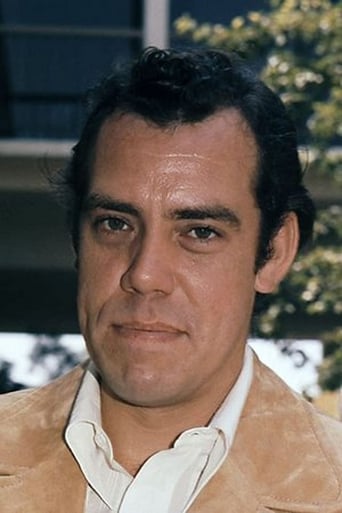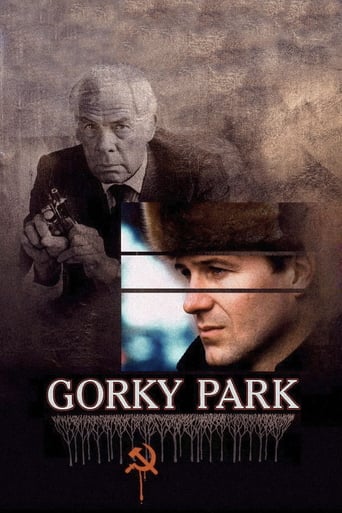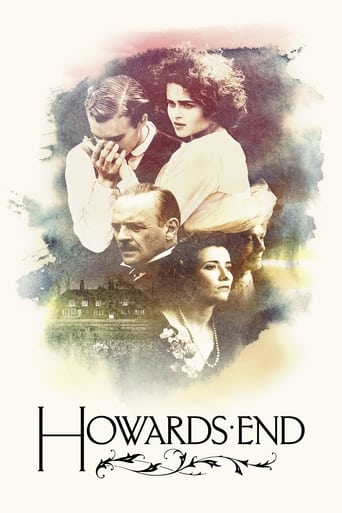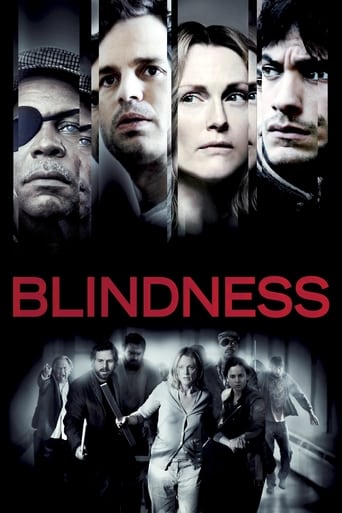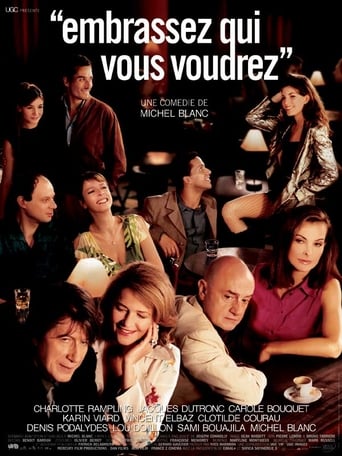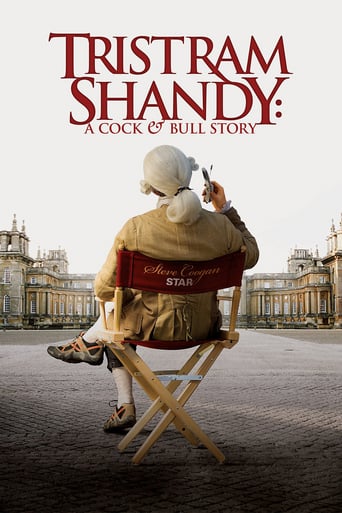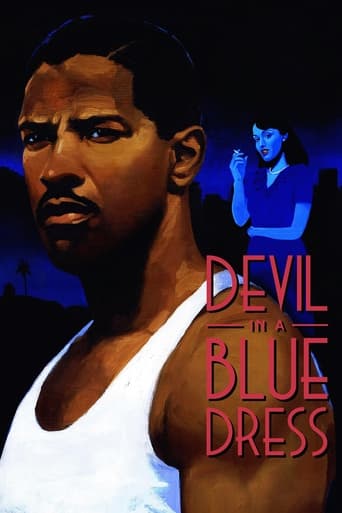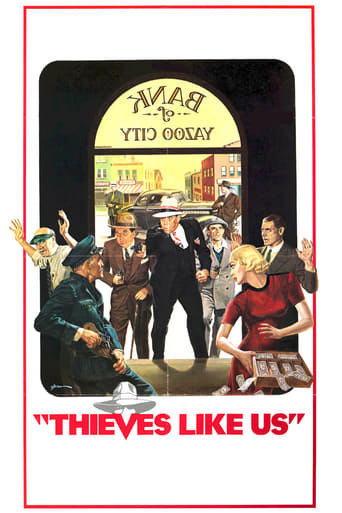
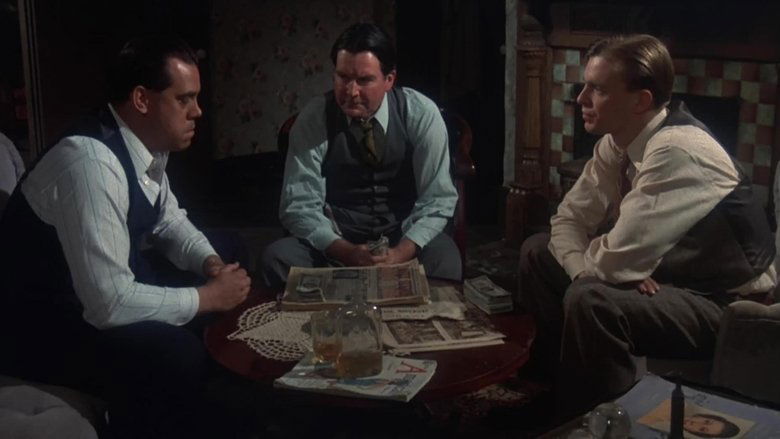
Thieves Like Us (1974)
Bowie, a youthful convicted murderer, and bank robbers Chicamaw and T-Dub escape from a Mississippi chain gang in the 1930s. They hole up with a gas station attendant and continue robbing banks. Bowie, who is injured in an auto accident, takes refuge with the daughter of the gas station attendant, Keechie. They become romantically involved but their relationship is strained by Bowie's refusal to turn his back on crime. The film is based on the novel Thieves Like Us by Edward Anderson. The novel is also the source material for the 1949 film They Live by Night, directed by Nicholas Ray.
Watch Trailer
Cast


Similar titles
Reviews
This adaptation of Edward Anderson's 1937 novel of the same name, focuses on the exploits of a gang of Depression-era bank robbers and a doomed love affair. The characters involved and the ways in which they relate to each other are fully explored and their rural Mississippi environment is recreated in a way that's both very authentic-looking and aesthetically pleasing. Their story is told in a style that's realistic, unglamorous and non-judgemental but also significantly, with the accompanying sound of a whole series of radio broadcasts that are deeply evocative, often pertinent to what's taking place on-screen and sometimes amusingly ironic.Three convicts serving long-term sentences escape from Mississippi state prison and hide out at a filling station run by Dee Mobley (Tom Skerritt). Gang-leader T-Dub (Bert Remsen), short-tempered Chicamaw (John Schuck) and youngest member, Bowie (Keith Carradine) soon get back to their criminal ways when they embark on a series of bank robberies with the aim of stealing enough cash to be able to live comfortably for the rest of their lives. T-Dub, as the most experienced gang member, masterminds the robberies which are mostly carried out without any problems.The gang have a great deal of downtime between robberies and Bowie, who hails from the Ozarks and was serving a life sentence for murder, is strongly attracted to Mobley's young daughter, Keechie (Shelley Duvall) who also works at the filling station. The couple grow closer after Bowie is involved in a car accident and Keechie nurses him back to health. Although the couple fall deeply in love, there's also a constant tension because Bowie remains fiercely loyal to his fellow gang members and both he and Keechie are constantly aware of the danger that he's in as the authorities get ever closer to bringing a permanent end to his freedom.Nicholas Ray's "They Live By Night" (1948) was also based on Edward Anderson's novel and interestingly there are some differences in the ways that the characters are portrayed in the two productions. In Ray's movie, Bowie had been unjustly found guilty of murder and after his escape from prison had misguidedly got involved in bank robbery as a means of getting sufficient money together to pay for the legal help he needed to prove his innocence of that charge. In "Thieves Like Us" however, the same character is depicted as a simple-minded person who has no regrets about what he did and has a propensity to keep allowing himself to be led by the wrong people. Similarly, the other gang members are portrayed as being equally simple individuals whose criminal activities (unlike in Ray's film) are not in any way related to the impact of the Great Depression.The quality of the acting in this movie is consistently top class with Keith Carradine and Shelley Duvall brilliantly displaying Bowie and Keechie's awkwardness and lack of polish and Bert Remsen excelling as the ever-optimistic and good humoured T-Dub whose enthusiasm for his work is infectious. John Schuck also makes the volatile Chicamaw memorable by the sheer power of his performance, especially when his character starts to drink heavily and gets progressively more violent but also when his frustration drives him into self-destructive behaviour (e.g. during his second escape from Mississippi state prison).Unusually, in this movie, some of the incidents which could have produced a great deal of excitement, suspense or drama (e.g. all but one of the bank robberies and the fates of key characters) are not shown on-screen. "Thieves Like Us" is unquestionably a very accomplished movie that's better appreciated now than it was at the time of its initial release but the decisions to make the characters less sympathetic than they were in Nicholas Ray's movie and to eschew the old "show, don't tell" adage were probably responsible (at least in some part) for its poor box office returns.
Lackadaisically effective remake of Nick Ray's "They Live By Night", a handsome 1950s film noir where the characters, although played by some terrific actors, always seem ready to break into song, this is to that film what "The Long Goodbye" is to "The Maltese Falcon"... turning slow-burn cool into an idle handed, haltingly-paced, shaggy Devil's playground. Keith Carradine turns in a flighty, dazed, yet realistically down-home performance as the boyish escaped-convict sandwiched between two older, and in some ways, more experienced criminals. It would be hard to take the two side baddies, played by John Schuck and Bert Remsen, very seriously if they were cast as tough guys in a tough guy film to begin with. All three are desperate, pathetic losers who rob banks for a quick buck - one of them, Schuck, happens to be quite dangerous when cornered. The dialog between the trio are like grownup kids stuck in an endless detention class (i.e. prison). And Shelley Duvall's moll, unlike the first film's beauty (played by an actress who's more gorgeous than corn-fed/homely), is really a side character, used prominently in the second half after Carradine's injured in a car wreck. And while their chemistry lacks the instantly-driven-spark of the original, it's nice to have the romantic aspect - more accidental than staged - tucked in the backseat where (I feel) it belongs. But the most effective element isn't the acting, or Robert Altman's ever-gliding camera-work, but the radio programs, like "The Shadow", playing in the background throughout, providing a subliminal narration dictating events such as the crooks robbing their banks - which we only see from the outside two out of three times - or the programs running during the downtime, between bank jobs; all these scenes which can seem quite boring to anyone expecting an actual gangster film, but is what, in my opinion, makes this anti-gangster picture click. And is why I prefer it to the original. Beautifully-shot melodrama is replaced with an uncontrived, purposely sloth-toed tale about what (unconventionally-cast) criminals do when they're not doing bad things. And Louise Fletcher, as Remsen's relative who allows the men to stay in her house, gives a subtly-sly performance you have to watch a few times before fully realizing she's more than just filler.
"They Live by Night," the 1948 screen adaptation of the Edward Anderson novel "Thieves Like Us," and other films that have obviously been inspired by it, like "Gun Crazy" (1949) and "Bonnie and Clyde" (1967), have all been so good that it makes you wonder if yet another version of the same story is necessary. The answer is yes, because Robert Altman is behind this version, and if Altman proved nothing else as a director, he proved that he could take any material and make it his own.Altman's "Thieves Like Us" is a beautiful and heartbreaking version of the lovers-on-the-lam story, with Keith Carradine cast as Bowie, the soft spoken, sensitive member of a trio of escaped convicts and bank robbers (the other two, Chickamaw and T-Dub, played by Altman regulars John Schuck and Bert Remsen, respectively). During a lull in their series of robberies, Bowie sets up house with Keechie (Shelley Duvall), a shy, simple country girl, and they take a stab at a sort of domestic bliss despite the fact that Bowie is doomed and it's only a matter of time before the law catches up to him. Meanwhile, T-Dub's sister-in-law, Mattie (Louise Fletcher), who has helped the fugitives because of family obligations, begins to tire of the example the trio are setting for her own children, and becomes an accomplice to the police trying to track down the criminals.Previous screen versions of this story cast gorgeous actors as the lovers and made us fall in love with them. In 1948 it was Farley Granger and Cathy O'Donnell; in 1967 it was Warren Beatty and Faye Dunaway. We fall in love with Carradine and Duvall too, but for different reasons. They are decidedly NOT gorgeous actors -- they're both skinny, ungainly and awkward. But they're both incredibly simple and sweet, and they have some lovely and naturalistic moments together that make us wish these two could just settle down, have a family and achieve their own small share of happiness. Altman constantly reminds us of the happiness these two are denied through use of an endless parade of print and radio advertisements that serves as a running commentary throughout the film. During a horrible depression during which so many people could afford nothing, Altman seems to be accusing the American consumerist culture of incessantly reminding everyone of what they didn't have. The way to happiness, Altman implies, seemed to lie in material comforts; no wonder the trio of men in this film prefer robbing banks to the alternatives available to them.And there's another theme winding its way through Altman's version, one which appeared again and again in his work, that of frustrated male inadequacy. The men in this film turn to the most destructive behavior (thieving, drinking, sexual aggression) in order to cope with a world they feel they've lost control of, and this behavior is continuously juxtaposed to the feminine, domestic sphere represented by Mattie, eternally capable and resourceful, and resentful of the disruption the men bring along with them."Thieves Like Us" does not have that beautiful, ethereal sheen to it that characterized Altman's other early-1970s films, mostly because he did not use expert cinematographer Vilmos Zsigmond on this outing. But thanks to the winsome performances of Carradine and Duvall, and the touching representation of their characters' tentative relationship, this is one of his warmest and emotionally resonant films from that time period.Grade: A
When altman chooses to not show t-dub getting killed, rather reveal it to bowie the same time he reveals it to us in a news broadcast, i thought it was a very strange choice, but also an appropriate one. most of the action in this movie is in radio broadcasts and newspapers, with very only two full robberies. I sometimes have problems watching the 70's altman stuff only because the sound recording technologies didn't really match up to his vision, and frequently things are too muddled to understand more than one or two words(IE the rainstorm.) That was a pretty terrible fake rainstorm, either that or the copy of the film we screened was damaged. I liked it more than bonnie and Clyde, mostly because it was more subdued, less flashy, more subtle, more about friendship and consequences.it was good. real good.they oughta put it on a DVD.




